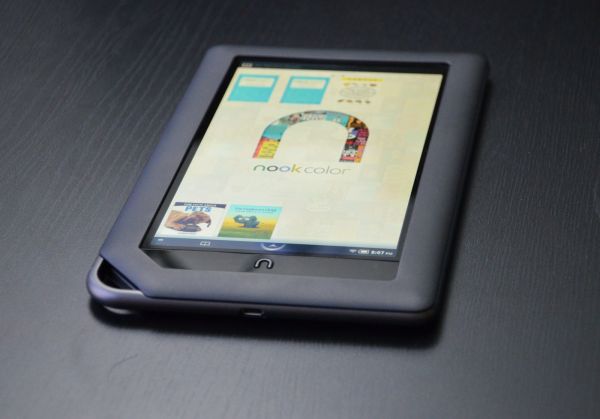Battle of the Budget Tablets - Nook Color vs. Galaxy Tab
by Vivek Gowri on May 25, 2011 12:52 AM ESTRooting the Nook Color
When you boot the Nook, you’re taken to this lovely 5 step process that registers you with B&N’s site (there’s no way around this unless you avoid the stock ROM entirely) and gets your device on to the internet. When you get through this, you’re taken to a startup page that lets you select whether you want a tutorial on how to use the Nook Color or whether you actually just want to use it. Uhhhhh, yeah, I think I’ll just go to the home screen, thanks.
The homescreen gets you thumbnails of the book covers you have downloaded, and bringing up the menu (with a soft button at the bottom of the screen) gives you the option to go to settings, the browser, market, list of applications, etc. You can tell it’s running Android, but it’s relatively dumbed down, presumably so that the general non-techy public doesn’t find themselves confused by the inner workings of Android.
The only thing that surprised me about the Nook OS in general is the amount of stuttering I saw. The original OS was pretty bad, and the update to Nook 1.2 (read: Froyo) fixed some of that, but you could still see the occasional dropped frame as you navigated through the OS. But I got sick of the Nook OS in about 5 minutes, so I went straight to XDA to get me some CM7.

CyanogenMod 7 is basically a community-built and supported ROM based on Gingerbread, and it’s pretty sweet. The rooting process was fairly straightforward, first installing ClockworkMod Recovery, then flashing CM7 and the associated Google apps (Mail, Market, Talk, etc) onto the device. The XDA developer forums are very helpful with rooting and flashing different ROMs onto these devices, and there’s a number of different customizations you can do, including overclocking (the Nook Color supports up to 1.2GHz) and various skins and enhancements.
I have to commend Barnes and Noble in all of this for being not discouraging rooting or hacking the device, when I talked to some of the Nook reps, they definitely understood that the NC was developed for people who weren’t tech enthusiasts, but the enthusiast market could do whatever they wanted with it. Unlike some of the larger handset manufacturers who go out of their way to discourage jailbreaking or rooting, this was a refreshing mindset for them to take.
So now that our Nook Color is all nice and Gingerbread-ified, let’s see what Samsung has in store.











89 Comments
View All Comments
Johnmcl7 - Wednesday, May 25, 2011 - link
I'd assumed the two Tabs were identical bar the 3G, I found out about the downgraded Wifi version recently thankfully after I'd bought the 3G version as I'd been annoyed to have bought the wifi version and then found out about the inferior spec.I think you're quite right to say here the SoC downgrade is pretty terrible but I'd say the article doesn't make that very clear on the first page and the Tab intro.
John
VivekGowri - Wednesday, May 25, 2011 - link
To be completely fair, it's not the biggest deal in the world - unless you're gaming a lot, you won't notice. And when I say gaming, I mean serious 3D games; Angry Birds and other casual games run just fine on OMAP 3.It just bugs me that Samsung was really, really not forthcoming about the SoC change at all.
Oscarcharliezulu - Wednesday, May 25, 2011 - link
As a consultant, the cameras are extremely useful to take pictures of (non electronic) whiteboards, a presenter's ppt at a conference (where you might not be able to get a copy easily or quickly) and then add your notes to it. Lots of my colleagues do this also.I also use it to take pictures for eBay listings.
Im always surprised when a journalist states they can't imagine what the camera is for just because they don't use it. Hope this helps your research.
VivekGowri - Wednesday, May 25, 2011 - link
Okay, this is exactly what I want - I don't use it, so I want to know what people do use it for. Thanks for your response!See, I do take a lot of pictures of documents, notes, homework sheets, etc, but even though I usually have a tablet with me (usually either my iPad or whichever one I'm testing), I mostly end up taking those pictures with whatever smartphone I'm carrying. It just feels much more natural to take pictures with a smartphone, either because the similar size of the phone and a point and shoot, or because we're just conditioned to cameraphones.
Like, I guess my question is more - when everyone has a smartphone/cameraphone, do tablets (which generally have the same or sometimes worse sensors than their smartphone cousins, and are more awkward to take pictures with) really get used as cameras that often?
mushu - Wednesday, May 25, 2011 - link
Thanks for the writeup Vivek. Good to see a comparison here on anandtech. A few of points:- the OC kernel for the nook supports speeds up to 1.2 GHz and the previous kernel went up to 1.3.
- Many people feel there're significant differences wrt performance and usability between the latest linux (2.6.32-based) kernel and the one preceding it (.29).
- If you use the 2.6.32 kernel make sure you also use the latest B&N bootloader, otherwise you'll encounter several performance related problems, notably with video.
- Make sure you have good battery data and that you don't only look at one kind of task. When mucking about with custom ROMs and kernels and bootloaders you run the risk of suffering from errors related to battery calibration. I regularly get 8-10 hours of surfing and reading on my NC, ie. with screen and wifi on and never at peace.
- I hope you looked at the cyanogenmod settings dialog where there is a set of tablet tweaks! Most important of these is the ability to have the softkeys and the status bar at the bottom of the screen. About as limited as honeycomb tablets may get without standard hardware keys :P Ie. not very limited at all. Move the keys down Vivek :o
- Never mind the stock browser on any non-honeycomb android device. Check out opera mobile.
The nook is a great device for those who enjoy tinkering and who do not want to pay extra for things like cameras.
VivekGowri - Wednesday, May 25, 2011 - link
Haha, right now I wish I had talked to you before I started this article. You know a lot more about this than I do, all of which I picked up in a brief amount of surfing on the XDA forums. I went for a quick root - just the latest rev of CM7 (about three weeks ago?), Google Apps, and that's it. I'm not a huge proponent of overclocking mobile devices, since the long-term wear and tear it results in tends to shorten the life of the system.I like the bar being at the top, and I didn't mind the softkeys being up there, it just required a little bit of mental recalibration. I'll check that out though!
Battery-wise, that's about what I was expecting - B&N quotes 8 hours of life with the wifi off, so 6.5 hours with a stressful wifi test sounded fine to me. I understand that people can do a ton of tinkering and tweaking to the OS for performance, battery, usability, whatever floats their boat, and I really love that about the Nook Color. I just wanted to get a feel for what it was at the base level.
MonkeyPaw - Wednesday, May 25, 2011 - link
Yeah CM7 is constantly improving with nightly builds, so 3 weeks ago is actually a long time. There are other options that update, too. I ran rooted 1.2 until the beta 3.1 with sleep fix. I've been running the beta for a week and had great luck. Took maybe 15 minutes to get it running. The NC really is a great piece of hardware for the price. If you like playing with new ROMs as much as you like using it as a tablet, its a fun purchase. There's even an Ubuntu build under development.VivekGowri - Thursday, May 26, 2011 - link
I had the Nook for exactly 2 weeks, I didn't want to spend a whole bunch of time experimenting with various ROMs and nightly builds. I just grabbed the latest nightly and went from there. But that's basically what I was referring to - if you want to get really into that, there's a great community behind development for the Nook.Shadowmaster625 - Wednesday, May 25, 2011 - link
Can we get battery life and surface temperature readings of an 800 MHz Nook vs a 1000 MHz Nook?RomanMtz - Wednesday, May 25, 2011 - link
How does the Viewsonic G-Tablet compare to these at $289?